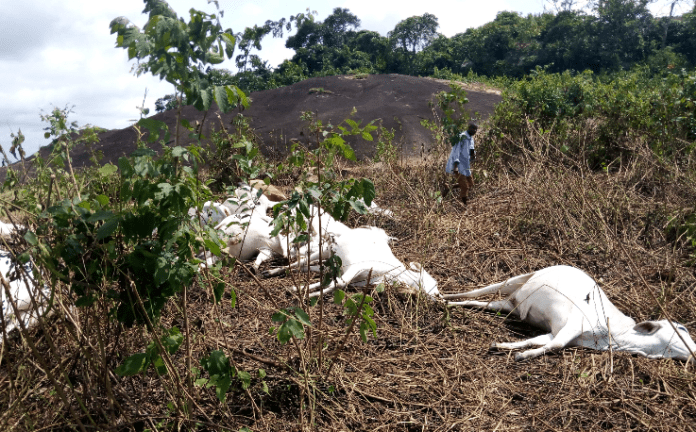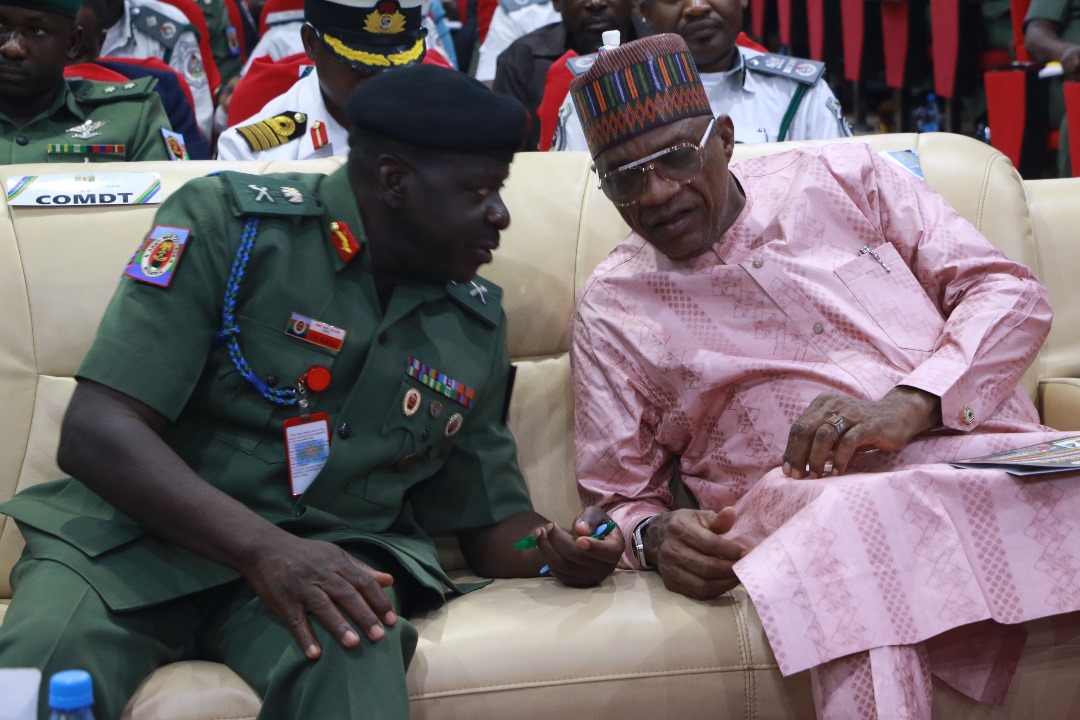Metro
Thunder Kills 36 Cows in Ondo Community

No fewer than 36 cows were reportedly killed by lightning and thunder on the top of a sacred hill at Ijare town in Ifedore Local Council of Ondo State.
The Guardian learned that the fearful incident happened on Saturday night at the hill located on the outskirts of the agrarian community known as “Oke Owa,” a place forbidden to trespassers.
According to a reliable source, only the king of the town and some chiefs have the exclusive right to visit the town and perform some rituals once in a year during the celebration of the new yam festival.
One of the natives of the town whose house is located near the scene, but pleaded anonymity, said they didn’t know initially that the thunder had already wreaked havoc on the mysterious hill until a hunter alerted the people of the community the following morning that he saw some slain cows on the hilltop.
When The Guardian visited the hilltop, there were 36 cows sprawling lifelessly on the ground without any mark on their bodies, drawing the attention of people who came from far and near to see the gory incident.
There were indications that herders were trying to settle around the place as there was a shed under construction with tubers of yam and pepper scattered in the vicinity.
The most awful aspect of the mass death, as garnered from the natives, the carcasses would be abandoned on the mysterious hill unburied because it is a taboo to touch the slain animals.
The Olujare of Ijare, who spoke through his second-in-command and Sapetu of Ijare, Chief Wemimo Olaniran, said that the incident was an act was of God.
Olaniran, however, noted that the herders had been destroying their farmland for a very long time and this had led to several confrontations between the herders and the farmers.
He said it was surprising to them when they heard five days ago that some Fulani were ascending the sacred hill to settle after they had destroyed many farmlands and created fears in the minds of the people.
He said: “We were there this morning and we saw about 36 cows dead apart from the ones inside the bush. It has happened and there is nothing we can do. We regard it as the act of God, which nobody can query.
“There have been occasions like that but not as massive as we are having it now. In the past, we did witness thunderbolt attack when you desecrated any part of Ijare, particularly the sacrifice places, the groves.
“The dead cows will be there forever; it is part of the history in our land for people to see as testimony in the future that such a thing happened. A whole Oba was buried there live and heaven did not fall talk less of ordinary cows.
“Oke Owa is a sacred hill where the Oba and some of his chiefs visit once a year during new yam festival to offer sacrifices on behalf of the community.
“Even those chiefs accompanying the Oba must not go to the inner part of the hill because there is a particular place where only the Oba has to enter and spend a night.
“This is a hill that the herdsmen wanted to desecrate with their herds. It is taboo. When we heard about the incident, we invited the herdsmen and they confirmed that it was thunder that struck the cows.
“We went to the police station to report the matter and the Divisional Police Officer was contacted before chiefs, including myself, went there. Those cows would remain there and rotten because nobody must touch them.”
Meanwhile, the state Police Public Relations Officer (PPRO), Mr. Femi Joseph, who confirmed that the matter was reported at Ijare Police Station, described the incident like a natural disaster that was unfortunate and nobody could do anything about.
The Guardian
Metro
NANTA: Pinheiro Advocates Charter Status, Stronger Constitution

Pinheiro Calls for Charter Status, Stronger Constitution to Reposition NANTA as a Global Force
At the 49th Annual General Meeting of the National Association of Nigeria Travel Agencies (NANTA), Professor ’Kemi Pinheiro, OFR, delivered a compelling call to action, urging members to rally behind a vision of a “Legally Grounded, Ethically Driven, and Globally Respected Association.”
In a deeply reflective presentation,0 Pinheiro underscored the urgent need for NANTA to adopt a robust constitution and pursue charter status to secure its relevance and authority in Nigeria’s travel and tourism sector.
Speaking to an audience of stakeholders and industry leaders, the legal luminary described the Association’s current legal framework, registered as an Incorporated Trustee under Part F of the Companies and Allied Matters Act (CAMA) 2020—as insufficient to support its ambitions of professional regulation and global recognition.
Without a statutory charter, he said, NANTA lacks the structural muscle to effectively govern its members or regulate professional standards in the industry.
Pinheiro likened the constitution of an organization to the design of an airport terminal: “When done right, everything flows smoothly… but when done poorly, confusion reigns.” This metaphor set the tone for a presentation rooted in legal precedent, philosophical insight, and pragmatic recommendations.
Drawing from authorities such as Sebastine T. Hon, SAN, and referencing judicial pronouncements, including the Court of Appeal’s ruling in Mohammed v. Sokoto (2021), he emphasized that a constitution is far more than a formal document, it is the foundational legal instrument that legitimizes power, organizes governance, and upholds ethical standards.
Tracing the implications of NANTA’s draft constitution, Pinheiro pointed out gaps that undermine clarity and legal certainty.
For instance, he highlighted the absence of clear guidelines on who can vote on behalf of a corporate member, potentially exposing the Association to disputes and administrative inefficiencies.
Similarly, he questioned the vague status of probationary or “associate” members, asking whether they hold voting rights or can participate in governance—a lack of clarity that risks perceptions of arbitrariness.
On the issue of dormant membership, Pinheiro noted that while the constitution rightly penalizes financial default, it fails to outline the rights or restrictions of such members, nor does it clarify procedures for reactivation.
He also stressed the need for the constitution to reflect statutory provisions regarding the disqualification of trustees, particularly the exclusion of minors, as stipulated in Section 826 of CAMA.
“Good governance,” Pinheiro asserted, “is the oxygen that sustains any thriving association.”
He drew from philosophical traditions, including Hobbesian political theory, and quoted experts like Mark Goyder to underscore the balance required between leadership and governance.
A strong constitution, he said, bridges these two, enabling NANTA to navigate change, prevent abuse, and maintain its integrity.
The presentation also compared NANTA’s governance framework to that of other professional bodies such as the Nigerian Bar Association and the American Society of Travel Advisors (ASTA), both of which enshrine ethical standards and participatory governance in their foundational documents.
Pinheiro advocated for similar codification in NANTA’s constitution, especially in an industry where trust and professionalism are paramount.
Crucially, he called on members to actively engage in the constitutional review process, invoking the words of Indian philanthropist Rohini Nilekani: “We cannot be mere consumers of good governance; we must be participants; we must be co-creators.” Participation, he emphasized, ensures that the constitution reflects the collective will and aspirations of its members.
With a powerful reminder, Pinheiro said, no association can rise above the unity, vision, and commitment of its membership. If NANTA is to evolve into a global force in travel and tourism, it must first ground itself in a constitution that commands respect, enforces ethics, and withstands the test of time.
Metro
‘Blogger’s Continuous Detention Not Connected to Zion Ministry’

The Zion Prayer Movement Outreach has debunked media reports attributing the continued detention of a blogger, Harrison Ofoegbu (Ijele Speaks) to the ministry.
At a press conference in Lagos on Saturday, the ministry’s Media Adviser, Dan Aibangbe, and members of the legal team described reports by Sahara Reporters that Ofoegbu had been detained by its Spiritual Director, Evangelist Ebuka Obi, for one year as completely false and misleading, explaining that the blogger’s release order was signed by the court on August 15, 2024, after he perfected his bail conditions.
However, Ofoegbu is being held for other cases unconnected with Zion Ministry including a case at the Federal High Court, Awka, Anambra State. Zion said Sahara Reporters was fully aware of this but has instead chosen to mislead the public with falsehood, Aibangbe explained. He also clarified that Ofoegbu was on trial for threatening the life of Evangelist Ebuka.
Mrs Ugonna Okpara of the Zion Legal team who showed journalists at the conference the release papers signed by the court, explained that the blogger’s defence counsel had confirmed to the judge who tried to find out why he was still in detention that their client was being held for another case at the Federal High Court in Awka which has nothing to do with Zion Ministry or Evangelist Ebuka Obi.
Other members of the ministry’s Legal team, Kingsley Okigbo and Gerty Iloegbunam, who spoke at the briefing also called on the journalists to carry out their investigation at the Correctional Center to confirm why the blogger was still in detention. They equally advised the media not to be deceived by the false and misleading account being circulated by Sahara Reporers.
Watch the video below:
https://www.facebook.com/share/v/18uRHxVZ1R/?mibextid=wwXIfr
Metro
Gaidam Reiterates Importance of Real-Time Intelligence Sharing

The Minister of Police Affairs, Senator Ibrahim Gaidam, has reiterated the need to establish a seamless and secure mechanism for real-time intelligence sharing, enhancing capacity for proactive and preemptive responses to threats.
He stated this, according to a statement by Deputy Director, Information and Public Relations Unit, Bolaji Kazeem, and made available to the National Association of Online Security News Publishers (NAOSNP), the during an Interagency Security Seminar with a theme: Multiplicity of Operations in Nigeria’s Contemporary Security Landscape: Optimizing Multi-Agency Efforts for Effective Treat Response, organized by the Army War College Nigeria Course 9/2025 held at the TYB Auditorium, ACWN, Wu Bassey Barracks, Asokoro, Abuja.
The Minister, who was the Special Guest of Honour, pointed out that to optimize multi-agency efforts for effective threat response, they must tackle critical gaps in our security architecture.
“Institutionalizing cross-agency training exercises and scenario-based drills will improve operational interoperability and foster mutual trust. By leveraging modern technologies – such as advanced surveillance systems, artificial intelligence, and digital forensics – we can enhance our operational effectiveness.”
He said the security environment in Nigeria has undergone a profound transformation. We face a complex web of threats, from insurgency and terrorism in the North-East to banditry and farmer-herder conflicts in the North-West and North-Central regions. Additionally, we grapple with separatist movements in the South-East and organized crime in the South-South and South-West.
Gaidam opined that this multiplicity of threats necessitates a comprehensive approach that engages the entire government and society.
“These challenges are compounded by economic disparities, governance deficits, and the increasing sophistication of criminal enterprises that exploit technology, porous borders, and ungoverned spaces,” he stressed.
According to him, “The traditional view of security, limited to military or law enforcement responses, is no longer adequate. We must embrace an integrated approach that brings together all stakeholders, including military forces, law enforcement agencies, intelligence services and civil society.
The Minister expressed that the multi-agency collaboration is not merely an option; it is a necessity. Effective security management today requires a robust interagency coordination framework.
The complexity of contemporary threats demands that the Nigeria Police Force strengthen operational synergies with other agencies, including the Nigerian Army, Nigerian Navy, Nigerian Air Force, Department of State Services (DSS), Nigerian Security and Civil Defence Corps (NSCDC), Nigerian Immigration Service (NIS), and Nigerian Customs Service (NCS).
Gaidam stressed the role of the civilian population as a vital asset in security management. Strengthening police-community relations and fostering public trust through community policing initiatives will significantly improve our intelligence-gathering capabilities and preventive security measures.
Earlier, the Guest lecturer, Major General Babagana Mohammed Monguno (Rtd) stated that globally military operations play a significant role in restoring peace and stability, noting that nations implement security strategies to minimize the security threats to their economic and diplomatic relations.
“With the Nigerian military operations currently being conducted across all geopolitical zones despite the success recorded by the ongoing operations, security threats continue to persist across the country, disrupting daily livelihood and instilling fear among the citizens and there is the need for comprehensive approach to mitigate contemporary security threats across Nigeria,” he said.






